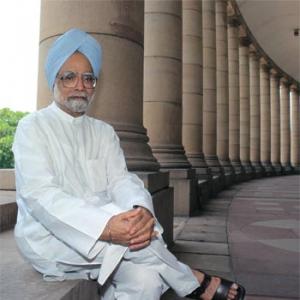Prime Minister Manmohan Singh has told his Pakistani counterpart Yousuf Raza Gilani that all issues between the two countries can be resolved if the trust deficit could be eliminated, Parliament was informed on Monday. Making an identical statement in Lok Sabha and Rajya Sabha on the Prime Minister's visit to Bhutan where he met Gilani, External Affairs Minister S M Krishna said Singh had conveyed India's "serious concerns" over terrorism emanating from Pakistan and sought expeditious action against the perpetrators of the Mumbai attack.
The minister could not read out the statement in Lok Sabha and laid it amid the din caused by members who were targeting Telecom Minister A Raja in the 2G spectrum issue. In the Rajya Sabha, members wanted to seek clarifications on the statement but Ministers of State for Parliamentary Affairs Prithviraj Chavan and V Narayansami said it could be done either on Wednesday or Thursday.
In the statement, Krishna said Singh had a cordial and frank discussion with Gilani in Thimphu where the two leaders had come to attend the 16th SAARC summit. "He (Singh) told him (Gilani) that if the trust deficit between India and Pakistan can be eliminated all issues can be resolved through dialogue," Krishna said.
Quoting Singh, the Minister underlined that good neighbourly relations between India and Pakistan were in the interest of both the countries as well as in the interest of the peace, stability and development in the region. Singh urged Gilani to expedite action against perpetrators of Mumbai attack and was assured that Pakistan was serious about bringing these perpetrators to book.
Krishna said that the Foreign Ministers and Foreign Secretaries of the two countries have been entrusted with the responsibility to work out mechanisms on how the trust deficit can be removed.
Krishna said Singh also had the opportunity of having bilateral meetings with the Presidents of Sri Lanka and Maldives, and the Prime Ministers of Bangladesh and Nepal. "There was a common desire among all our neighbours to further strengthen their relations with India," the External Affairs Minister said.
Rajapaksa informed Singh of his government's efforts for political reconciliation and for bringing lasting peace in thecountry. The prime minister congratulated Rajapaksa on the recent election victory in Presidential and Parliamentary elections, and reiterated India's commitment to assist Sri Lanka in its relief and rehabilitation efforts, and to strengthen bilateral relations in diverse areas.
With Bangladesh Prime Minister Sheikh Hasina, Singh reaffirmed India's commitment to expeditiously implement the various decisions taken during her landmark visit to Indiain January 2010. During meeting with Nepalese Prime Minister Madhav Kumar Nepal, Singh conveyed India's support for the ongoing efforts of the people of Nepal for the consolidation of multi-party democracy there, Krishna said. Both sides expressed satisfaction at the progress made in India-Nepal cooperation since the visits of Prime Minister Nepal to India in August 2009 and the president of Nepal in February 2010, he said.
About the SAARC Summit, Krishna said it provided an opportunity to reflect upon what has been achieved in the two and half decades, what more needs to be done, and on the kind of a South Asia the member countries wish to create for their present and future generations. At the two-day Summit held on April 28-29, Singh stressed that regional cooperation should enable freer movement of people, of ideas, and of goods and services. He underlined that it was not sufficient to merely conclude agreements and conventions and the challenge was to translate these agreements into practical activities and programmes, which touch the lives of our people. "There was a convergence of views on the need to transform SAARC into a truly action-oriented, people-centric and dynamic regional organization," Krishna said, adding there was unanimous condemnation of terrorism in all its forms and manifestations.
The leaders of the SAARC countries exchanged views on deepening regional cooperation for tackling the effects of global warming in our region, and how we can benefit from each other's experiences and strengths. "There was widespread appreciation for India's initiatives and role in contributing to the region's stability and prosperity," Krishna said.








